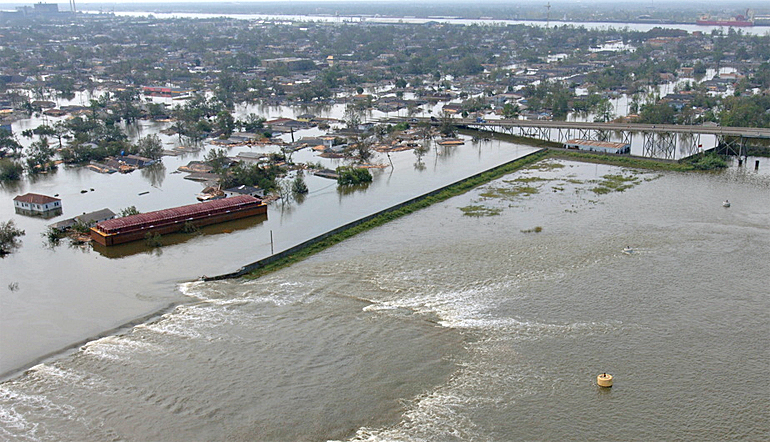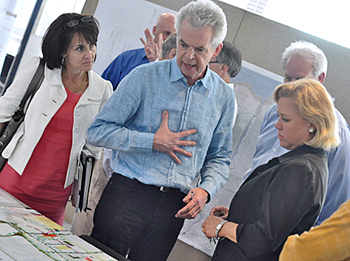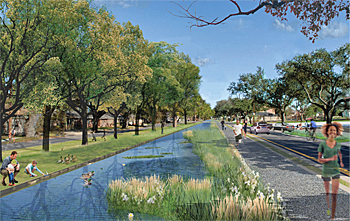Ten years after Katrina: New Orleans should adopt a flood safety-first strategy

"To put New Orleans back on a path of sustainable growth, the city requires a combination of what the Dutch call a safety-first strategy with an improvement in the quality of the urban environment. A delta city should not only be safe to live in but also attractive and enjoyable."
These are the words of Dutch professor Han Meyer of the Delft University of Technology published on the website of the Guardian in a reflection on the commemoration that New Orleans was hit by hurricane Katrina ten years ago on 29 August 2005 (top photo).
US president Obama announced he will be present at the commemoration.
 Professor Han Meyer (middle) with senator Mary Landrieu (right) during the third Dutch Dialogue in New Orleans in April 2010.
Professor Han Meyer (middle) with senator Mary Landrieu (right) during the third Dutch Dialogue in New Orleans in April 2010.
Dutch dialogues on integrated urban planning
Professor Han Meyer is specialised in urban design and has been a principal organiser of the Dutch Dialogues with New Orleans since 2005 that included several workshops with city planners, architects, water experts, local politicians and citizens on integrating urban planning, hydraulic engineering and landscape architecture.
In his reflection Meyer concludes that New Orleans needs more than a simple repair of its floodwalls and storm surge barriers.
To be able to become a real flourishing delta city it should embrace a holistic urban design philosophy, based on a flood safety-first strategy, writes the Dutch professor.
Meyer: "US and Dutch planners brought together to start a process of rebuilding New Orleans – myself included – decided that a key issue to address after Katrina and Rita was not just how the city should be redeveloped given the threat it faces from natural hazards, but also how to integrate a fundamental reconsideration of its character as a leading water city. More was needed than simply repairing the floodwalls and storm surge barriers."
 Impression of how New Orleans could look like when it adapts the concept of Living with water.
Impression of how New Orleans could look like when it adapts the concept of Living with water.
Living with water
"To put New Orleans back on a path of sustainable growth, the city requires a combination of what the Dutch call a safety-first strategy with an improvement in the quality of the urban environment. A delta city should not only be safe to live in but also attractive and enjoyable. This is how we propose to combine these two requirements".
Meyer believes New Orleans can adapt more effectively to what the Dutch call the principle of living with the water.
"Rather than seeing flood protection systems as exclusively to keep water out or contained", he says, "the city can secure the vibrant future it deserves by better exploiting the economic, societal and cultural gain of being a world leading water city. For instance, there are exceptional opportunities to create more of the amenities, like canals, lakes and ponds, that grace other world class water cities such as Amsterdam and Venice."
Read the original reflection by Han Meijer on the website of the Guardian (20 August 2015).
See full event calender 10-year anniversary of hurricane Katrina: www.katrina10.org.
Read also on this website
● Colombian-Dutch Dialogues looks for options to stop erosion on RN90 motorway, Colombia, 1 December 2014
● Deltas 2014: Launch of 12 building blocks for a sustainable delta approach, 2 October 2014
● New Orleans' new urban water plan builds on Dutch dialogues making the city more liveable, 11 September 2013
● Delta cities share experiences on flood control and heat waves at C40-workshop in Rotterdam, the Netherlands, 10 June 2013
● First post-Sandy conference in New York on a long-term flood risk reduction strategy involved Dutch experts, 2 January 2013
● Project: Greater New Orleans urban water plan
● Country: USA
More information
Delft University of Technology
Section Urban design - urban compositions
Delft, the Netherlands
+31 15 27 83 885
www.bk.tudelft.nl
Dutch Dialogues
www.dutchdialogues.com
Royal Netherlands Embassy
Washington, USA
+1 202 244 5
www.the-netherlands.org
and
www.the-netherlands.org/key-topics/water-management



